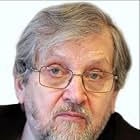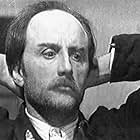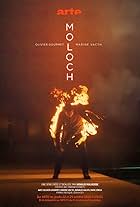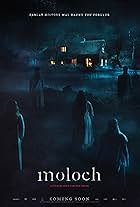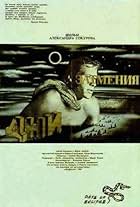VALUTAZIONE IMDb
6,7/10
2632
LA TUA VALUTAZIONE
Nel 1942, in Baviera, Eva Braun è sola, quando Adolf Hitler arriva con il dottor Josef Goebbels e sua moglie Magda Goebbels e Martin Bormann per trascorrere un paio di giorni senza parlare d... Leggi tuttoNel 1942, in Baviera, Eva Braun è sola, quando Adolf Hitler arriva con il dottor Josef Goebbels e sua moglie Magda Goebbels e Martin Bormann per trascorrere un paio di giorni senza parlare di politica.Nel 1942, in Baviera, Eva Braun è sola, quando Adolf Hitler arriva con il dottor Josef Goebbels e sua moglie Magda Goebbels e Martin Bormann per trascorrere un paio di giorni senza parlare di politica.
- Premi
- 7 vittorie e 9 candidature
Eva Mattes
- Eva Braun
- (voce)
Peter Fitz
- Adolf Hitler
- (voce)
Irina Sokolova
- Dr. Josef Goebbels
- (as Leonid Sokol)
Trama
Lo sapevi?
- QuizOfficial submission of Russia for the 'Best Foreign Language Film' category of the 72th Academy Awards in 2000.
- ConnessioniFeatured in Cinemania: I anodos kai i ptosi tou Nazismou (2008)
- Colonne sonoreSiegfried's Funeral March from DIE GÖTTERDÄMMERUNG
By Richard Wagner
Recensione in evidenza
The year is 1942. Hitler is at the height of power. He and his inner circle retreat to a misty mountaintop castle in the Alps. Eva Braun, nearly naked and alone, basks in solitude on the ramparts. It is her only escape from the burden of loving a human chimera. Thus begins Alexander Sokurov's film MOLOCH, which won the Best Screenplay Award at the 1999 Cannes Film Festival.
Webster's Third International English Dictionary describes Moloch as an ancient Semitic deity, and the figurative definition runs as, "A tyrannical power propitiated by human subservience or sacrifice." The latter is definitely in evidence as the film explores Braun's personal world and tribulations, as well as the grotesque behavior of Hitler and his obsequious associates. The film does not attempt to mirror history; rather it is a bold speculation that takes its cues from the past.
Leonid Mozgovoy's performance as Hitler is uncanny. He is nervous, annoyed, self-absorbed, even vulnerable, and oblivious to the strained relations around him, including his troubled relationship with Braun, played by Yelena Rufanova. Their final scene is particularly compelling, where Braun in sympathetic tones tells Hitler as he is about to be driven away in his sedan, "Death is Death. It cannot be defeated."
In a unique maneuver, Sokurov had his entirely Russian cast voice the dialogue in German, after which they were dubbed by native German actors from Berlin, creating a nearly seamless result.
Unfortunately, the Russian version of the film in theaters had a voice-over translation (done entirely by Mozgovoy), which interferes with the German text, defeating the whole purpose of going to all that trouble. This decision was made in deference to Russian audiences, which are used to – and even sometimes prefer – this type of translation, but subtitles would have worked much better. Luckily, the Russian DVD has this option (Russian subtitles only).
The film is more streamlined than other Sokurov efforts, and may be called one of his best works, if not the best. The editing and pacing are smoother than that of many of his other films. The recently released video version of the film contains 21 minutes of footage not seen in the theatrical version. The long version plays well, with more rich detail, more expository elements such as additional manifestations of Eva's mischievous nature and Adolf's sensitivity to smells and foodstuffs.
Sokurov studied history at Gorky State University before becoming a filmmaker. He makes highly idiosyncratic, strikingly atmospheric and ponderously paced works, drawing inspiration from classical literature and music – what he calls "Old World art." He crafted the film from a screenplay entitled "The Mystery of the Mountain" (originally the title of the film), written by Yury Arabov, with whom he has collaborated frequently.
The film can rightfully be called a cinematic milestone because of its portrayal of Hitler. For the first time in narrative film history, Hitler is shown to be human. This is ultimately a valuable artistic judgment, for it fosters understanding of the political forces that he set in motion.
Sokurov notes, "Erich Fromm wrote that until we learn to understand Hitler's human nature, we will never understand anything about Nazism or learn to discern potential monsters in those lusting for power."
Webster's Third International English Dictionary describes Moloch as an ancient Semitic deity, and the figurative definition runs as, "A tyrannical power propitiated by human subservience or sacrifice." The latter is definitely in evidence as the film explores Braun's personal world and tribulations, as well as the grotesque behavior of Hitler and his obsequious associates. The film does not attempt to mirror history; rather it is a bold speculation that takes its cues from the past.
Leonid Mozgovoy's performance as Hitler is uncanny. He is nervous, annoyed, self-absorbed, even vulnerable, and oblivious to the strained relations around him, including his troubled relationship with Braun, played by Yelena Rufanova. Their final scene is particularly compelling, where Braun in sympathetic tones tells Hitler as he is about to be driven away in his sedan, "Death is Death. It cannot be defeated."
In a unique maneuver, Sokurov had his entirely Russian cast voice the dialogue in German, after which they were dubbed by native German actors from Berlin, creating a nearly seamless result.
Unfortunately, the Russian version of the film in theaters had a voice-over translation (done entirely by Mozgovoy), which interferes with the German text, defeating the whole purpose of going to all that trouble. This decision was made in deference to Russian audiences, which are used to – and even sometimes prefer – this type of translation, but subtitles would have worked much better. Luckily, the Russian DVD has this option (Russian subtitles only).
The film is more streamlined than other Sokurov efforts, and may be called one of his best works, if not the best. The editing and pacing are smoother than that of many of his other films. The recently released video version of the film contains 21 minutes of footage not seen in the theatrical version. The long version plays well, with more rich detail, more expository elements such as additional manifestations of Eva's mischievous nature and Adolf's sensitivity to smells and foodstuffs.
Sokurov studied history at Gorky State University before becoming a filmmaker. He makes highly idiosyncratic, strikingly atmospheric and ponderously paced works, drawing inspiration from classical literature and music – what he calls "Old World art." He crafted the film from a screenplay entitled "The Mystery of the Mountain" (originally the title of the film), written by Yury Arabov, with whom he has collaborated frequently.
The film can rightfully be called a cinematic milestone because of its portrayal of Hitler. For the first time in narrative film history, Hitler is shown to be human. This is ultimately a valuable artistic judgment, for it fosters understanding of the political forces that he set in motion.
Sokurov notes, "Erich Fromm wrote that until we learn to understand Hitler's human nature, we will never understand anything about Nazism or learn to discern potential monsters in those lusting for power."
I più visti
Accedi per valutare e creare un elenco di titoli salvati per ottenere consigli personalizzati
- How long is Moloch?Powered by Alexa
Dettagli
Contribuisci a questa pagina
Suggerisci una modifica o aggiungi i contenuti mancanti












